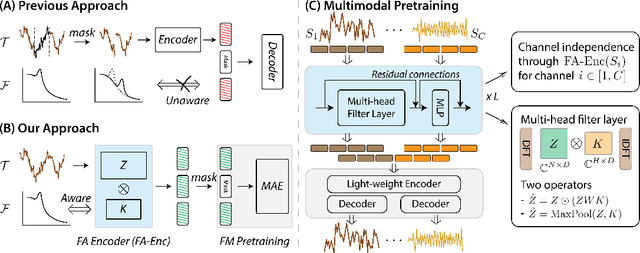Chris Sandino
Generalizable autoregressive modeling of time series through functional narratives
Oct 10, 2024



Abstract:Time series data are inherently functions of time, yet current transformers often learn time series by modeling them as mere concatenations of time periods, overlooking their functional properties. In this work, we propose a novel objective for transformers that learn time series by re-interpreting them as temporal functions. We build an alternative sequence of time series by constructing degradation operators of different intensity in the functional space, creating augmented variants of the original sample that are abstracted or simplified to different degrees. Based on the new set of generated sequence, we train an autoregressive transformer that progressively recovers the original sample from the most simplified variant. Analogous to the next word prediction task in languages that learns narratives by connecting different words, our autoregressive transformer aims to learn the Narratives of Time Series (NoTS) by connecting different functions in time. Theoretically, we justify the construction of the alternative sequence through its advantages in approximating functions. When learning time series data with transformers, constructing sequences of temporal functions allows for a broader class of approximable functions (e.g., differentiation) compared to sequences of time periods, leading to a 26\% performance improvement in synthetic feature regression experiments. Experimentally, we validate NoTS in 3 different tasks across 22 real-world datasets, where we show that NoTS significantly outperforms other pre-training methods by up to 6\%. Additionally, combining NoTS on top of existing transformer architectures can consistently boost the performance. Our results demonstrate the potential of NoTS as a general-purpose dynamic learner, offering a viable alternative for developing foundation models for time series analysis.
Frequency-Aware Masked Autoencoders for Multimodal Pretraining on Biosignals
Sep 12, 2023



Abstract:Leveraging multimodal information from biosignals is vital for building a comprehensive representation of people's physical and mental states. However, multimodal biosignals often exhibit substantial distributional shifts between pretraining and inference datasets, stemming from changes in task specification or variations in modality compositions. To achieve effective pretraining in the presence of potential distributional shifts, we propose a frequency-aware masked autoencoder ($\texttt{bio}$FAME) that learns to parameterize the representation of biosignals in the frequency space. $\texttt{bio}$FAME incorporates a frequency-aware transformer, which leverages a fixed-size Fourier-based operator for global token mixing, independent of the length and sampling rate of inputs. To maintain the frequency components within each input channel, we further employ a frequency-maintain pretraining strategy that performs masked autoencoding in the latent space. The resulting architecture effectively utilizes multimodal information during pretraining, and can be seamlessly adapted to diverse tasks and modalities at test time, regardless of input size and order. We evaluated our approach on a diverse set of transfer experiments on unimodal time series, achieving an average of $\uparrow$5.5% improvement in classification accuracy over the previous state-of-the-art. Furthermore, we demonstrated that our architecture is robust in modality mismatch scenarios, including unpredicted modality dropout or substitution, proving its practical utility in real-world applications. Code will be available soon.
 Add to Chrome
Add to Chrome Add to Firefox
Add to Firefox Add to Edge
Add to Edge